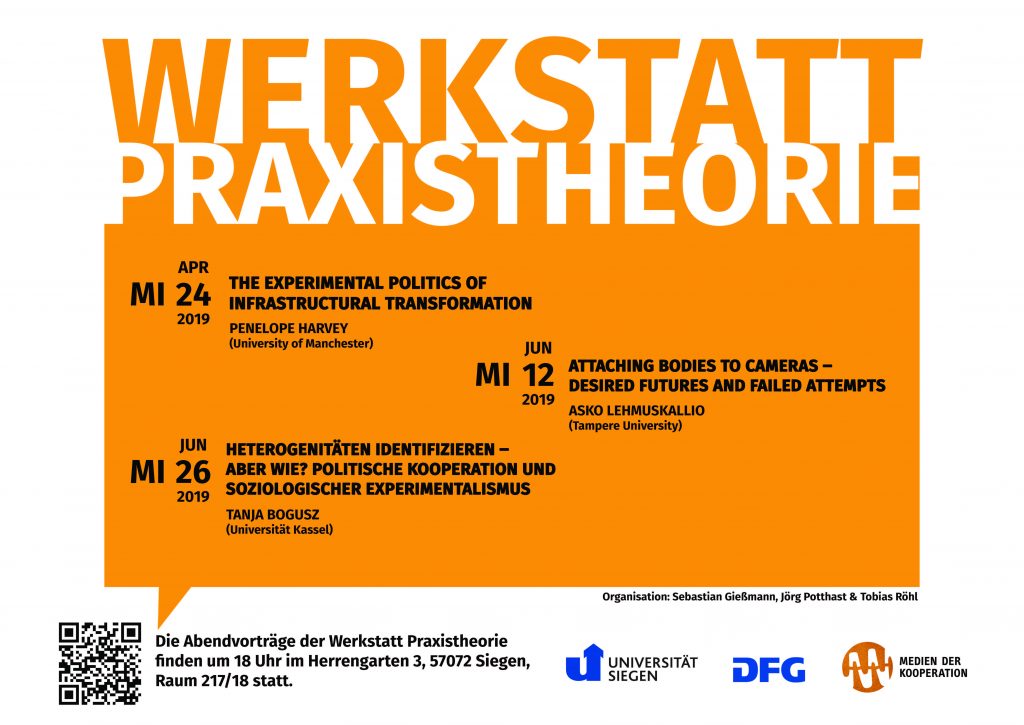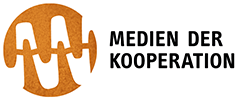Workshop Practice Theory Sommer 2019
This semester the workshop practice theory will focus on media practices of registration and identification.
The lecture and workshop series on Practice Theory aims to develop a new perspective on media history and media analysis. It is giving primacy to “practice” while focussing on processes of media production and work. We set out exploring media practices related to “coordination”, “delegation”, “registration & identification”,both with regard to a sound empirical foundation and to theoretical reflection. These categories are used to investigate media practices that specifically interconnect publics and infrastructures. Our lecture and workshop series on Practice Theory is dedicated to “Theoretical Empiricism” and will assemble international research that addresses questions of theory and empirical research symmetrically. For this purpose, three further categories are brought into play as part of the practice turn, namely repair work, experimentation, and actualization.

Talks in the Sommer Term 2019:
Wednesdays at 18:00
Campus Herrengarten, Room AH- 217/18
The paper argues that an ethos of experimentation is of central importance to contemporary neoliberal state politics – characterised by administrative decentralization, economic liberalization, infrastructural investment, and managerial government. Focusing primarily on the indeterminate and emergent forms of political life that take hold around processes of state decentralization in post-war Peru, the paper examines the complex politics of scale that mark relationships between diverse instances of the state. These emerge with particular clarity in infrastructure projects where attempts to reconfigure specific material and social relations confront conflicting competencies of national, regional and local agencies. A proliferation of technical instruments and norms are brought to bear in an attempt to contain the disruptive effects of such multiplicity. However, in practice, the diverse origins and orientations of these instruments and norms, foster ambiguity and uncertainty. State functionaries and citizens alike skilfully mobilize the multiple possibilities that the ambiguous regulatory frameworks offer them. But such attempts also reveal the precarious quality of the political, the arbitrary enactments of power and the techniques of differentiation that the ethos of experimentation also enables.
Since the early days of photography, it was hailed for the novel vistas that it provided. For being able to see with the help of photography, both the moment of capture, as well as the development of the captured image, had to be carefully orchestrated. Various ways for doing so were developed, and how-to-guides were distributed and published. A particular interest evolved in exploring the interrelations between bodies and photographic technology, since camera technology was considered to be useful for detecting and identifying both individuals and collective types. In order to do so, initial preparation and subsequent forms of analysis were of particular interest, and the various forms developed may be considered particular suggestions for attachment. This interest continues today, as camera technologies are deployed ‘in the wild’ for purposes of detection, registration and identification, often coupled to partially automated systems. This paper discusses exemplary couplings between bodies and camera technologies, and points towards a remaining tension in their use: a suspicion towards both bodies and technologies.
In sociology, practices of identifying and classifying are the subject investigations of social disparities (Bourdieu 1999), as well as the basis for the analysis of decision-making processes (Luhmann 1990), the investigation of critical actor competencies (Boltanski & Thévenot 2007), and evaluation practices (Lamont 2012, Kropf and Laser 2019). At the same time, however, social science research contributes to the production of political realities, including the formation of political states (Desrosières 1993, Bowker & Star 1999, Law & Urry 2004, Didier 2009). Consequently, the sociological experimentalism developed by me following Dewey (Dewey 1996, 2008) suggests that the observed should be methodologically linked to one’s own research practice: Like social actors, we also identify and classify and thus contribute to the production of socialities (Bogusz 2019). This applies in particular to practices of cooperation which, supported and motivated by the media, take place in society as well as being part of social science research practice. This trivial-sounding statement becomes a complex challenge as soon as political cooperation, as demanded by Richard Sennett (Sennett 2012), is no longer primarily used by relatively homogeneous actors, but rather by sociomaterially and culturally heterogeneous ones, in order to redirect traditional as well as currently progressive political fragmentation processes. On the basis of the chapter “Testdurchlauf III: Was heißt Kooperation? Experimentalismus als Beitrag zu einer kritischen Sozialökologie” in my book “Experimentalismus und Soziologie” (Bogusz 2018) I want to reflect with You on the question of how and by what means heterogeneities can be identified in such a way that political cooperation is possible. In this lecture I will outline 1) the theoretical foundations of sociological experimentalism and 2) its methodological heuristics on the basis of selected successful heterogeneous collaborations. In the workshop, I would like to discuss three questions in depth – also on the basis of media-scientific material: 1) How can sociomaterially heterogeneous contributors be identified for dealing with political problems, and what trade-off effects could such an identification have for social and media-scientific research? 2. what mediation and motivational competences do media have, who and what do they include and exclude, and how could they make socio-cultural heterogeneities capable of (infra-)structuring, i.e. monitor, co-ordinate and even delegate corresponding political processes? 3. How could parameters for a social and media science update of critical publics be developed from these findings?
Cited Literature
Bogusz, Tanja (2018): Experimentalismus und Soziologie. Von der Krisen- zur Erfahrungswissenschaft. Frankfurt am Main & New York: Campus.
Bogusz, Tanja (2017): „Zur Soziologie der Bewertung in Pragmatismus und Experimentalismus. Symmetrie, Objektkonstitution, Forschungspraxis“, in: Lessenich, Stephan (Hg.): Geschlossene Gesellschaften. Verhandlungsband des 38. Kongresses der DGS, 26.-30.9.2016 in Bamberg. Frankfurt am Main & New York: Campus.
Boltanski, Luc und Laurent Thévenot (2007): Über die Rechtfertigung. Soziologie der kritischen Urteilskraft. Hamburg: Hamburger Edition.
Bourdieu, Pierre (1974): „Strukturalismus und soziologische Wissenschaftstheorie“, in Ders.: Zur Soziologie der symbolischen Formen. Frankfurt am Main: Suhrkamp, S. 7-41.
Bourdieu, Pierre (1999): Die feinen Unterschiede. Kritik der gesellschaftlichen Urteilskraft. Frankfurt am Main: Suhrkamp.
Bowker, Geoffrey und Susan Leigh Star (1999). Sorting Things Out. Classification and It’s Consequences. Cambridge, Massachusetts und London: MIT Press.
Dewey, John (1996): Die Öffentlichkeit und ihre Probleme. Bodenheim: Philo.
Dewey, John (2008): Logik. Die Theorie der Forschung. Frankfurt am Main: Suhrkamp.
Kropf, Jonathan und Stefan Laser (Hg.) (2019): Digitale Bewertungspraktiken. Für eine Bewertungssoziologie des Digitalen. Wiesbaden: Springer VS.
Lamont, Michèle (2012): „Toward a Comparative Sociology of Valuation and Evaluation”, in Annual Review of Sociology, 38. Jg., S. 201-221.
Law, John und John Urry (2004): „Enacting the social“, in: Economy and Society, 33. Jg., Heft 3, S. 390-410.
Sennett, Richard (2012): Together. The Rituals, Pleasures, and Politics of Cooperation. London: Penguin.


